10 Octavia Butler Quotes to Live By (original) (raw)
On what would have been her 72nd birthday, we look back at some of the brilliant author's most timeless words of wisdom.
Promoted by Open Road Media | By
Carolyn Cox | Updated Jun 22, 2019 | Published Jun 22, 2017
The late speculative fiction author Octavia Estelle Butler was born on June 22nd, 1947, and would have been 72 today. In honor of her incredible time on this Earth, let's take a look back and remember her life and work, in her own words.
Throughout her career, Butler emphasized the importance of persistence and dedication to her success as a writer. As a child, Butler sought refuge in books despite her dyslexia. As an adult, she was resolute in her desire to tell stories, even as she was forced to work multiple jobs at one time to barely make ends meet. She was incredibly gifted, and even received the MacArthur Genius Grant to prove it! But without sheer willpower, Butler's work would never have been introduced to the world. As Butler herself wrote in the 1989 Essence magazine article "Birth of a Writer," "Forget talent. If you have it, fine. Use it. If you don’t have it, it doesn’t matter. As habit is more dependable than inspiration, continued learning is more dependable than talent."
RELATED: 15 Fascinating Facts About Octavia Butler
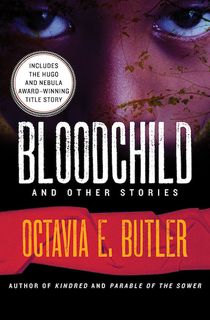
Want more from your favorite authors? Sign up for our newsletter and get the best in sci-fi sent straight to your inbox.
This quote from Butler's Parable of the Talents, the second title in the dystopian Earthseed series, is particularly compelling given the novel's disconcerting prescience. Parable of the Talents details the presidential campaign of Senator Andrew Steele Jarret, a religious zealot whose violent supporters kill people of opposing religious beliefs, or anyone they deem eccentric. Jarret occasionally condemns their violence, but "does so in such mild language that his people are free to hear what they want to hear." His campaign slogan? Make America Great Again.
RELATED: Which Dystopia Will the Donald Trump Presidency Most Resemble?
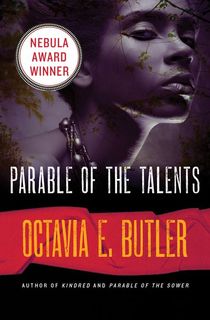
In a 1980 interview, later included in the interview anthology Conversations With Octavia Butler, the author described how black characters were perceived in Western literature at the time. This quote is a reminder of the importance of inclusive representation in speculative fiction, and to challenge why white characters, masculinity, and heterosexuality are still often presented as default.
RELATED: 9 Great quotes from Sci-Fi Legend Samuel Delany
This quote from Mind of My Mind, the second novel in the Patternist series, reflects Butler's own love of libraries and book collecting. As a child, she sought refuge from her bullying peers in the Pasadena library. Later in life, when she moved to Seattle well into her career, she brought 300 boxes of books with her to her new home.
This quote from Parable of the Sower, the first book in the Earthseed series, comes from "The Book of the Living," a fictional religious text created by protagonist Lauren Olamina. Lauren is a hyperempathetic teenager who, amidst environmental destruction and the collapse of the only home she's ever known, founds Earthseed—a religion based on the idea that God is change.
RELATED: Re-read: Octavia Butler's Parable Series
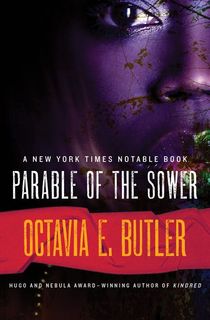
In Dawn, the first book in "Lilith's Brood," also called Xenogenesis, Lilith lyapo awakes to find that centuries have passed, and the Earth she knew is gone. She and other survivors of the apocalypse have been rescued by the alien race, the Oankali, whose knowledge may allow Lilith and the others to one day return home. In this passage, the Oankali named Jdahya explains how humanity's failure to acknowledge some of their most entrenched characteristics led to the end of the world.
RELATED: 8 Margaret Atwood Quotes for When the Bastard Grinds You Down
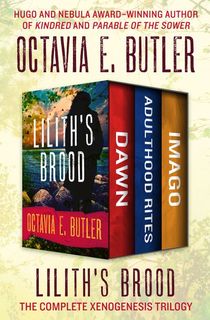
In Adulthood Rites, the second book in Lilith's Brood, Lilith and her fellow humans are divided into two factions: those who have agreed to breed with the Oankali, understanding that humanity, if left unchanged, will destroy itself again, and those who resist the union of Oankali and human. In this quote, Lilith is explaining that while humans still fear difference, Oankali crave the release difference provides from stagnation and overspecialization.
RELATED: Nnedi Okorafor Talks the Wild Seed TV Adaptation and Octavia Butler

Butler in Machu Picchu in 1985 conducting research for the Xenogenesis trilogy. Photographer unknown.
Photo Credit: Octavia E. Butler papers. The Huntington Library, Art Collections, and Botanical Gardens.
Another great quote from Lauren's "Book of the Living" in Parable of the Sower, this passage reflects the fascination with hierarchies and how human society is organized, which permeates much of Butler's work.
RELATED: Octavia Butler Books: The Complete Canon
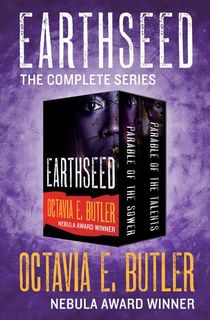
This wisdom comes from Butler's last book, Fledgling, the story of Shori, the only dark-skinned member of a vampiric race. Like many of Butler’s works, the story follows a woman forced to adapt to unmanageable circumstances. When Shori is found on the side of the road, she appears to be a black, ten-year-old human girl, but in fact she's a 50-something Ina woman. The Ina are a long-living, fast-healing species that have a symbiotic and codependent relationship with humans. The Ina need human blood to survive; humans can ingest Ina venom to increase their longevity, but withdrawal is fatal. The lone Ina with dark skin, Fledgling follows Shori as she comes to grips with her unique identity.
RELATED: 15 Bloody Good Vampire Books

Want more from your favorite authors? Sign up for our newsletter and get the best in sci-fi sent straight to your inbox.

Notes written by Octavia E. Butler for her novel Parable of the Talents, ca. 1996
Photo Credit: Octavia E. Butler papers. The Huntington Library, Art Collections, and Botanical Gardens
This quote comes from an appearance Butler made in the 1992 documentary Black Sci-Fi, in which she praised the opportunities for exploration that are inherent in the genre:
"[Sci-fi is] a wonderful way to think about possibilities. It’s a wonderful way to explore exotic politics. It’s a wonderful–it’s a freedom. It’s a way of doing anything you want. There are all sorts of walls around other genres. Romances, mysteries, westerns. There are no real walls around science fiction. We can build them, but they’re not there naturally."
[Via_ Feministing, Huffington Post, and_ Locus Online]
Featured photo: Patti Perret, photograph of Octavia E. Butler seated by her bookcase, 1986. The Huntington Library, Art Collections, and Botanical Gardens